| What is a "Just War.?"
Can America "justify war" under the ancient principles of the "Just
War?" How does Terrorism change the theory of a "Just
War?" How can the Principles of Vigilance be applied to
justifying war? When do we have the right to decide whether a
war is just or not? |
 VigilanceVoice VigilanceVoice

www.VigilanceVoice.com
Thursday--November 14, 2002—Ground
Zero Plus 428
___________________________________________________________
What Is A "Just War!"
___________________________________________________________
by
Cliff McKenzie
Editor, New York City Combat Correspondent News
GROUND ZERO, New York
City, Nov. 13 -- Today is
the 1,648th birthday of St. Augustine, the 4th Century author of the "Just
War Theory." Augustine was born on Nov. 13, 354, in
Tagaste (modern Souk Ahras, Algeria). He died almost
seventy-six years later in Hippo Regius (modern Annaba) on the
Mediterranean coast sixty miles away.
 |
|
Saint Augustine of
Hippo |
Augustine's moral war
compass still swings as the sabers of war rattle in the 21st Century.
This past week
(Tuesday, Nov. 11) the Catholic Bishops meeting in Washington D.C.
drafted a statement questioning the moral authority of a preemptive attack
on Iraq. It was framed from Augustine's "City of God" writings on
the issue of what constitutes a "Just War." Next month the
United Church of Christ pastors and theologians are meeting to issue a
"Just Peace Theology" they have been working on since 1980.
The moral scramble is on to squeeze the War
On Terrorism into former slots where conventional wars were either
approved as "moral" or denied as "immoral." The slots
were carved by St. Augustine thousands of wars ago.
Nailing Augustine's Just
War Principles to the wall in the 21st Century battle against Terrorism is
not unlike trying to nail Jell-0 to it. Revisions and adaptations
are being sought in hopes they won't impinge on Augustine's core
principles that sanction a war as moral if it involves just causes,
right values, right intention, exhaustion of alternatives probability of
success, and, a touch of modern adaptation, limiting civilian casualties,
it is considered "immoral."
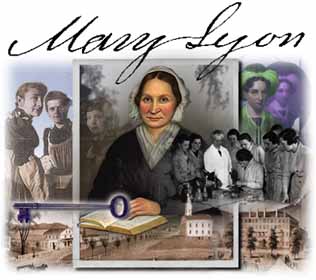 |
|
Mary Lyon
1797-1849
School teacher from Massachusetts.
An American Pioneer.
A remarkable woman who founded the worldwide model of higher education
for women - Mount Holyoke College. |
Mount Holyoke College, a higher education forum established on November 8,
1837 for women by Mary Lyon, offers a modern look at the principles.
Ms. Lyon established the college in the face of much fury that women
should "stay at home and cook" rather than venture into the world of
liberal education. Her creed was: "When the desire to do
the greatest possible good becomes firm and unshaken, I know not what may
not be attempted. Go where no one else will go. Do what no one
else will do." Here are the Principles of the Just War from
Holyoke, take from St. Augustine's writings in the "City of God":
Principles of the Just War
 | A just war can only be waged as a last resort. All non-violent
options must be exhausted before the use of force can be justified. |
 | A war is just only if it is waged by a legitimate authority. Even
just causes cannot be served by actions taken by individuals or groups
who do not constitute an authority sanctioned by whatever the society
and outsiders to the society deem legitimate. |
 | A just war can only be fought to redress a wrong suffered. For
example, self-defense against an armed attack is always considered to be
a just cause (although the justice of the cause is not sufficient--see
point #4). Further, a just war can only be fought with "right"
intentions: the only permissible objective of a just war is to redress
the injury. |
 | A war can only be just if it is fought with a reasonable chance of
success. Deaths and injury incurred in a hopeless cause are not morally
justifiable. |
 | The ultimate goal of a just war is to re-establish peace. More
specifically, the peace established after the war must be preferable to
the peace that would have prevailed if the war had not been fought. |
 | The violence used in the war must be proportional to the injury
suffered. States are prohibited from using force not necessary to attain
the limited objective of addressing the injury suffered. |
 | The weapons used in war must discriminate between combatants and
non-combatants. Civilians are never permissible targets of war, and
every effort must be taken to avoid killing civilians. The deaths of
civilians are justified only if they are unavoidable victims of a
deliberate attack on a military target. |
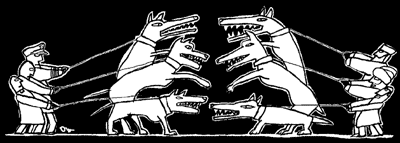 |
|
Jousting
over war and peace |
There are a
number of viewpoints about the need for making war morally "just."
University of Chicago ethicist,
Jean Belhke Eistain says that Just War Theory "...accepts human
wickedness. It acknowledges that humans sometimes do very bad things
to each other." She also reaffirms Augustine that a "Just War" cannot be
launched on the basis of realpolitik--pure national interests. She
added it must have universal benefits to the global community.
David Davenport of the Hoover
Institution at Stanford University notes that dark clouds hover over Just
War Principles. "The global village," he says, "cannot agree
on who has the authority to sanction warfare--any sovereign nation?
The United Nations alone?" He also says that in many
circumstance an army acts as "more like a high-level police force,"
negating the need for a declared war, a core to the principles of a Moral
Just War.
Quaker activist Annie Tunstall
in admonishing war says, "I don't believe there is a just war. War
is just left over from another age, and we haven't learned to live without
it."
The oxymoron, "just war,"
continues to thrive despite its critics. It is the attempt
civilization offers to not only question war but also to condone it as
part of human behavior. Some suggest the "moral war game"
perpetuates conflict by giving it moral justification, however flighty or
diaphanous that justification may end up being.
 |
That's why I propose
there is only one true test of a Just War--when it provides the world
security for the children's children's children. If it does
not erase a threat to the universal children's rights for peace and
prosperity, then such a war is unjust and immoral.
While this is a
simplistic approach, it cuts through the fodder flacking the issue.
The sharp blade of the question--"What's right for the children's
children's children?"--underscores the heart of St. Augustine's Just War
Principles: The ultimate goal of a just war is to
re-establish peace. More specifically, the peace established after the war
must be preferable to the peace that would have prevailed if the war had
not been fought.
Peace means only one
ultimate measure--more security and prosperity for the children.
And not just some of the children, all of them. A nation
seeking to selfishly protect only its own siblings cannot qualify, but if
that intention is universal, and its rippling effect washes over all the
globe to all the children, and has a firm grasp to the future
generations--the children's children's children--then it must be more just
than unjust. Justice can only be served to the innocent--those who
have not yet been victimized by war.
There is another factor,
however, that is more important than justifying a war's moral authority.
That factor is preventing the war from growing into one in the first
place.
War is the result
of society's Complacency. It can only exist when others turn their
heads to malignant growth of power and its misuse. When the
world turned its head from Hitler's buildup of weapons in violation of
arms limitations treaties following World War I, that Complacency led to
the eruption of Terror unequaled in the 20th Century. When
Saddam Hussein used biochemical gases to indiscriminately kill upwards of
100,000 Kurds, including men, women and children, it was a clear statement
of his despotic nature to wage war at "children's expense."
No action was taken then.
Similar examples in
Rwanda and other parts of Africa where bodies of men, women and children
clogged the rivers met with blank stares from the world community.
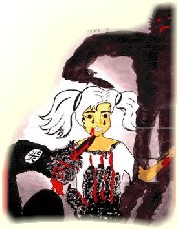 |
Few can argue that
if the world reacted to Acts of Terrorism within nations against their own
people, and, were to monitor the growth of weapons and massing of power
within nations aimed at overpowering others rather than defending just
their own borders, that war would be severely limited.
Vigilance is the
art of snuffing out the sparks of war before they turn into a
conflagration.
War cuts its fangs
on the principles of injecting Fear, Intimidation and Complacency on
others. It is about the strong becoming stronger and the weak
becoming weaker. As a nation or state grows in power and the
rest of the community cowers in its shadow, war looms.
Vigilance, on
the other hand, recognizes the presence of the Beast of Terror in all of
us, and that unless it is checked and managed, it can be unleashed upon
the innocent.
As ethicist Eistain stated, "Just war accepts human wickedness."
Societies that
ignore a Beast of Terror who waits in us all to be fertilized with Pride,
Anger, Greed, Lust, Envy, Gluttony and Sloth, will never pick up the
Shield of Vigilance or use the Pledge of Vigilance to protect themselves
from Fear, Intimidation and Complacency. They will wait until
the shadow of the Beast looms so large they are powerless to fight it.
The reason--Complacency.
However, when
one recognizes that each of us has the "power of wickedness," and to
protect that power from rising to the surface it must be disarmed, he or
she will be the first in line to take the Pledge of Vigilance and use the
Principles of Vigilance to protect himself or herself and his or her loved ones from
Terrorism's threats.
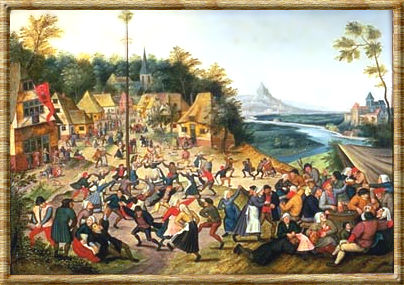 |
|
Maypole
Dance |
Pure peace
advocates ignore the need for Vigilance. They want everyone to
put down their weapons and dance around the maypole.
Idealistically, this is a beautiful. However, it only feeds
the Beast of Terror, allowing it to rise up unexpectedly to enslave the
peaceful in Fear, Intimidation and Complacency. Jim Jones exercised
that "wickedness within" when he ordered the poisoning of his followers in
Jonestown, Guyana in the '70s. Drinking Kool-Aid laced with
cyanide, members of his People's Temple killed themselves and their
children. In all, 914 died, 638 adults and 276 children.
Wars and wickedness
go hand-in-hand.
Had Vigilance been
instilled in the congregation of the Peoples Temple in Jonestown, they might never have
been swayed to go with Jim
Jones to Guyana in the first place, and, more importantly, the 638 adults
would never have even considered their suicides nor the killing of
their 276 children.
The Iraqi general
population does not want its children killed, or wish death and
destruction on other children. Despite politics, human
survival and the need to protect our children rises above our selfish
motives when our children are put in harm's way. But,
unfortunately, it is often too late to defend them after the war has
started. It is the pre-war Vigilance that is necessary to stave off
the dangers of war itself.
 |
When war looms as it is
today, we must first point our fingers at ourselves. We must ask:
"Was I as Vigilant as I could have been? Or, did I turn my
head and ignore the smoke that led to fire?"
The truth of the human
condition is that we are at war daily with Terrorism. We always have
been. We always will be. The Beast of Terror never sleeps, he just
naps. He's doing pushups all the time, waiting to spring into
action when we let our guard down.
We have with Iraq.
We didn't cry out as Parents of Vigilance when Hussein killed the women
and children. He should have been charged with crimes against
humanity then, and the jury should have been the Mothers and Fathers of
Vigilance.
Only when society has
practiced the art of Vigilance prior to a war, and that Vigilance fails to
stop the Beast of Terror, can the resulting war be called "just."
Wars that are the result of society's Complacency to be Vigilant cannot
suddenly be judged "moral" on the eve of their destructiveness.
Terrorism doesn't fall
outside the parameters of Augustine's principles of a just war.
If we study war, its conception occurs with Terrorism. It
gestates in the mind of a child, is fed by Fear, Intimidation and
Complacency. As the child grows, he or she seeks power to feed
his or her Beast of Terror. The evolution of such a child is a
Terrorist, one who uses his or her power to bully others to his or her
will.
A Hitler, Saddam Hussein,
Osama bin Laden, Jim Jones are the result of not bridling the Beast of
Terror within. A Pledge of Vigilance and a Mother, Father,
Grandparent of Vigilance could have stopped the growth of Terror in the
child. Courage could have replaced Fear, Conviction overpowered
Intimidation, and Right Actions would have taken hold over moral
Complacency to benefit the children's children's children.
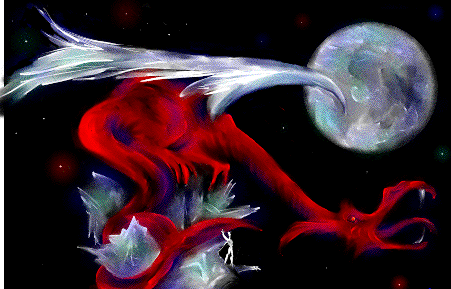 |
|
Howling Beast of
Terror |
Today, when we seek
to find the answer to justify any "moral war," we
must look in the mirror for the answer. Are
we Citizens of Vigilance or not? If we are, then
we will act to stop the seeds of Terrorism first within ourselves,
secondly within our children, and thirdly we will promote Vigilance
to the world.
If we
do this, when it comes time for us to vote on a moral war, we
will have the credibility of Vigilance to justly cast our vote.
But until we vow to be Vigilant, and to teach our children to
be Vigilant, we should back away from the voting poles and stop
dancing around the maypoles.

Nov. 13--The
Pharaoh Of Terrorism--bin Laden-- Returns To Center Stage
©2001
- 2004, VigilanceVoice.com, All rights reserved - a
((HYYPE))
design
|
|










